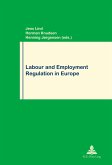In most of the EU's fifteen Member States sectoral collective bargaining is an important process, if not the principal means of regulating relations between employers and employees. Yet the sectoral level of social dialogue has long been neglected at Community level, coming a poor second behind cross-industry social dialogue. The tide now seems to be turning, and a formally recognised social dialogue has been established in more than thirty sectors. The authors of this volume consider recent developments in these sectors, providing a quantitative and qualitative overview as well as some more detailed analysis of particular sectors.
This volume is original in that it is based on a systematic collection of documents produced by the European sectoral and cross-industry social dialogue, along with a hundred or so interviews with the relevant players. Some of the main questions raised by the authors include: what is meant by sectoral social dialogue? How does it differ from crossindustry social dialogue? What type of negotiations take place? What are the aims and strategies of employers' organisations? Are the agreements implemented and, if not, why not? What difference has EU enlargement made in this area and what else might change? Is it possible to devise a typology of sectors? Without claiming to have definitive answers for all these questions, this volume offers some useful food for thought at a time when sectoral social dialogue is tentatively asserting its position Europewide.
This volume is original in that it is based on a systematic collection of documents produced by the European sectoral and cross-industry social dialogue, along with a hundred or so interviews with the relevant players. Some of the main questions raised by the authors include: what is meant by sectoral social dialogue? How does it differ from crossindustry social dialogue? What type of negotiations take place? What are the aims and strategies of employers' organisations? Are the agreements implemented and, if not, why not? What difference has EU enlargement made in this area and what else might change? Is it possible to devise a typology of sectors? Without claiming to have definitive answers for all these questions, this volume offers some useful food for thought at a time when sectoral social dialogue is tentatively asserting its position Europewide.








